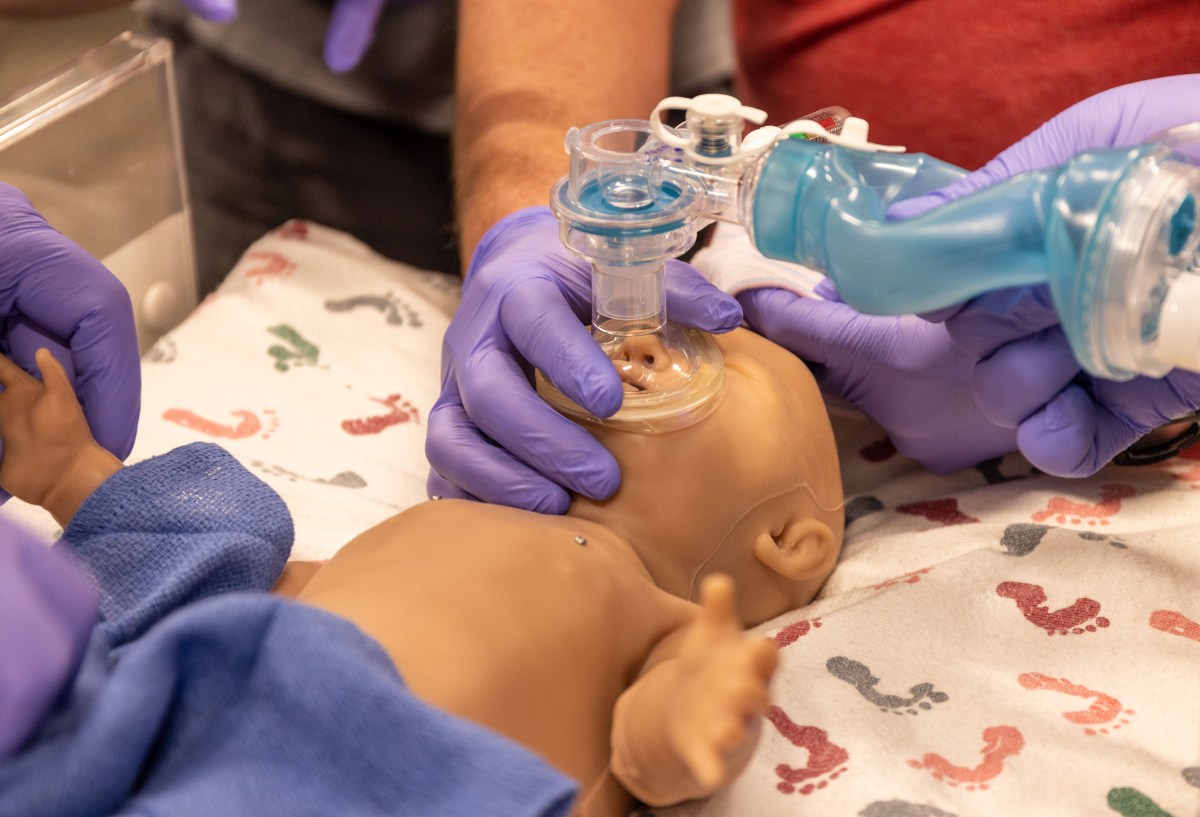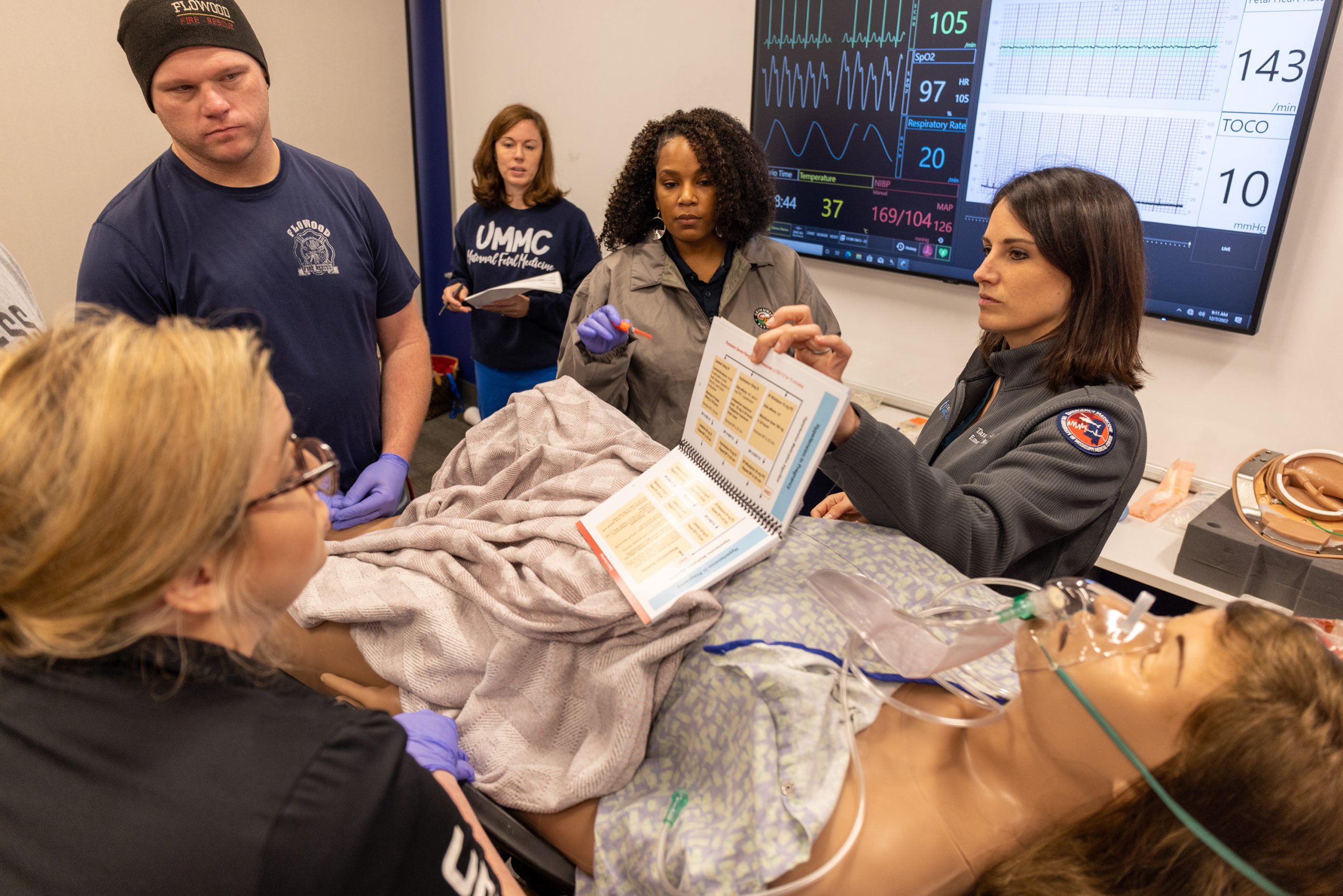Mississippi Today
Mississippi moms and babies are dying. This training teaches first responders how to save their lives.
Mississippi moms and babies are dying. This training teaches first responders how to save their lives.
Matt Greer of Brookhaven was driving home from his shift at the Mississippi Center for Emergency Services, where he works as a flight nurse, when he got a call from his younger sister. A few days earlier, she had given birth to a healthy baby girl after an uncomplicated pregnancy. Now, she told him she had a headache.
He asked her to check her blood pressure: 140/90.
For most patients, that reading isn’t concerning. For a pregnant or postpartum woman, however, it’s an indication of preeclampsia. Greer told her to go to the hospital and eventually she did, getting treatment to prevent seizure and stroke.
But Greer thinks things might have gone very differently had he not completed a new training run by the Mississippi Center for Emergency Services just a few weeks before his sister called.
The STORK Program equips first responders and medical professionals without specialized obstetrics training – including emergency room doctors and nurses – to handle pregnancy and delivery complications like hypertension and hemorrhage. Doctors at the University of Mississippi Medical Center recognized that in a rural state with dwindling options for obstetrical care, women are likely to deliver outside of dedicated labor and delivery wards, and to need care from people who don’t see pregnant patients every day. So they created the STORK training.
Greer has years of experience as a nurse, and his sister is a nurse, too. But without STORK, he would not have known how to interpret her blood pressure reading.
“I would have blown it off,” he said. “Without that fresh on my mind … I would have said, ‘that’s not too bad. You’ll be alright.’”
Chronic health conditions like obesity and diabetes plus poor access to prenatal care contribute to Mississippi’s worst-in-the-nation outcomes for moms and babies, and can’t be treated during a single interaction with a health care provider. But potentially lethal hypertension and hemorrhage are not complicated to manage – if a provider knows what to watch for and what to do.
And even inside hospitals, that can be a big “if.”
“Obstetrics is most people’s kryptonite,” said Dr. Rachael Morris, associate professor of maternal fetal medicine at UMMC, who created and leads the training. “Unless you’re an obstetrician, even a well-trained E.R. physician or mid-level provider is going to tell you that you bring a pregnant lady into my E.R., and everyone’s going to freak out.”
The STORK Program’s half-day training includes lectures and simulations to change that dynamic. (STORK stands for Stabilizing OB and Neonatal Patients, Training for OB/Neonatal Emergencies, Outcome Improvements, Resource Sharing, and Kind Care for Vulnerable Families.) The training is funded with a grant from the W.K. Kellogg Foundation, which also allows participants to receive a bag of supplies they can use during deliveries. The program is run by MCES, a division of UMMC that houses critical care transport services – including helicopter teams – and the state’s communications system for hospitals and first responders, Mississippi MED-COM.
“In Mississippi, infant and maternal mortality rates for people of color are among the highest in the nation and many families have to travel considerable distance to access care, creating obstetric emergencies,” said Wesley Prater, Kellogg Foundation program officer. “Our support of UMMC ensures providers across the state have the proper training to stabilize mothers and babies who need critical care.”
So far, about 150 people from around the state – a mix of registered nurses, physicians, medical residents, firefighters and paramedics – have completed the training over 11 classes since it launched in June. The team has 18 more trainings on the calendar.
With the state likely to tally an additional 5,000 births annually thanks to the abortion ban that took effect in July, obstetric services in the state are actually shrinking. The labor and delivery ward at Greenwood-Leflore Hospital closed in the fall. The Delta lost its only neonatal intensive care unit this summer. The NICU at Merit Health Central, which serves predominantly Black and low-income Jackson neighborhoods, also closed.
Already, more than half of the state’s counties are maternity care deserts: No labor and delivery ward. No OB-GYNs. No certified nurse midwives.
Women in rural areas face long drives to the nearest labor and delivery ward. Sometimes, that means they can’t make it there at all. Instead, they may give birth in an emergency room, at home while waiting for first responders to show up, or on the side of the road.
The STORK program staff hope training participants will be able to handle those situations effectively, saving lives along the way.
“These patients are going to be coming into really small hospitals and delivering or having problems,” said Dr. Tara Lewis, assistant professor of emergency medicine at UMMC and a former labor and delivery nurse.
Lewis joined the program to help tailor it to the needs of emergency room staff in small, rural hospitals.
“If providers don’t know how to make the diagnosis of what problem is going on, then they’re not going to know how to take care of them.”
PHOTOS: First responders trained on how to deliver babies
“You look like a really good uterus,” Morris told a burly Flowood firefighter and paramedic who had joined three of his colleagues to attend a STORK training at MCES on a recent Wednesday morning.
She had just given a presentation on managing hypertension and hemorrhage, and now it was time to demonstrate how to assist during a delivery.
The paramedic held a rubber baby as Morris demonstrated how a baby’s head will generally turn to one side as it leaves the birth canal, and how to use a finger to gently loosen the umbilical cord if it has looped around the neck.
In addition to the Flowood firefighters, attendees included a pediatric emergency room nurse at UMMC, a women’s health nurse in Meridian, and an emergency room nurse at Magee General Hospital who has assisted with three deliveries in the last year alone.
“That’s a lot considering it’s a small hospital with no labor and delivery resources,” she said.
There are regular STORK trainings at MCES open to people from all over the state. But the free training is also conducted at hospitals, so participants don’t have to travel and can see how to apply what they learn where they work.
After Morris finished her presentation, Emily Wells, a nurse practitioner and member of UMMC’s neonate transport team, explained how to care for newborns in the moments after birth. Since Jan. 1 of this year, the team has transported 390 babies to higher levels of care, and participated in 20 emergency room deliveries.
She described the recent delivery of a “rest stop baby,” who was born in a Toyota Camry en route to a hospital during a cold snap.
“Cold babies die,” she said, so the team had cranked up the heat inside the car and done everything they could to keep the baby warm.
In a hospital, the baby would be placed in an incubator. But in a pinch, any kind of plastic bag – maybe one that had been used to hold supplies now in use – could be placed around the baby’s body to conserve heat.

A woman had just delivered a baby at 26 weeks in her car, and now both had made it to the emergency room of their small-town hospital. She had delivered the placenta, too, but was still bleeding.
What should happen next? Half of the training participants gathered around their patient – a life-size mannequin lying on a hospital bed shouting “I’m bleeding” – and discussed what to do.
“At 26 weeks, I think the placenta abrupted,” Morris explained.
Blood trickled from the mannequin’s vagina, soaking a pad underneath her body. This was an important lesson, Leslie Cannon, now an educator with STORK after 25 years as a labor and delivery nurse, pointed out: In patients who aren’t pregnant, life-threatening hemorrhage often looks like a dramatic gush.
“Hemorrhage postpartum, it’s this trickle,” she said. “It’s a huge deal, because that trickle just keeps going.”
That’s important to keep in mind especially because it’s often not obvious when a woman is at serious risk because of bleeding.
“A young, healthy pregnant lady is going to look really good — until she’s about dead,” Morris had warned of hemorrhaging patients.
The students administered tranexamic acid to slow the bleeding.
As Morris had explained during her lecture, a student reached an arm into the uterus to sweep for pieces of retained placenta, which can cause life-threatening bleeding. (“It’s not a comfortable thing to do,” Morris warned.) Another student massaged the mannequin’s belly to cause the uterus to contract.
Eventually, the trickle slowed and stopped. Morris estimated the patient had lost a liter of blood.
Before everyone left, Morris and Wells gave out their cell phone numbers. Kace Ragan, project manager for STORK, explained that participants get supply bags that include QR codes they can scan to request refills — as long as the grant funding holds out — and report their experiences during deliveries.
Morris urged the attendees to text or call her with questions any time. Morris treats some of the most challenging pregnancies in the state and serves as obstetric COVID director at UMMC, meaning she’s spent the last two years witnessing devastating loss.
And yet, she told the training participants, she has “the luxury” of working in a hospital with plenty of resources and specialized training.
“Y’all are in the trenches doing things that I have to do, too, but with so much less,” she said.
This article first appeared on Mississippi Today and is republished here under a Creative Commons license.
Mississippi Today
After 30 years in prison, Mississippi woman dies from cancer she says was preventable
Behind Bars, Beyond Care:
A Mississippi Today investigation into suffering, secrecy and the business of prison health care
Susie Balfour, diagnosed with terminal breast cancer two weeks before her release from prison, has died from the disease she alleged past and present prison health care providers failed to catch until it was too late.
The 64-year-old left the Central Mississippi Correctional Facility in December 2021 after more than 30 years of incarceration. She died on Friday, a representative for her family confirmed.
Balfour is survived by family members and friends. News of her passing has led to an outpouring of condolences of support shared online from community members, including some she met in prison.
Instead of getting the chance to rebuild her life, Balfour was released with a death sentence, said Pauline Rogers, executive director of the RECH Foundation.
“Susie didn’t just survive prison, she came out fighting,” Rogers said in a statement. “She spent her final years demanding justice, not just for herself, but for the women still inside. She knew her time was limited, but her courage was limitless.”
Last year, Balfour filed a federal lawsuit against three private medical contractors for the prison system, alleging medical neglect. The lawsuit highlighted how she and other incarcerated women came into contact with raw industrial chemicals during cleaning duty. Some of the chemicals have been linked to an increased risk of cancer in some studies.
The companies contracted to provide health care to prisoners at the facility over the course of Balfour’s sentence — Wexford Health Sources, Centurion Health and VitalCore, the current medical provider — delayed or failed to schedule follow-up cancer screenings for Balfour even though they had been recommended by prison physicians, the lawsuit says.
“I just want everybody to be held accountable,” Balfour said of her lawsuit. “ … and I just want justice for myself and other ladies and men in there who are dealing with the same situation I am dealing with.”
Rep. Becky Currie, who chairs the House Corrections Committee, spoke to Balfour last week, just days before her death. Until the very end, Balfour was focused on ensuring her story would outlive her, that it would drive reforms protecting others from suffering the same fate, Currie said.
“She wanted to talk to me on her deathbed. She could hardly speak, but she wanted to make sure nobody goes through what she went through,” Currie said. “I told her she would be in a better place soon, and I told her I would do my best to make sure nobody else goes through this.”
During Mississippi’s 2025 legislative session, Balfour’s story inspired Rep. Justis Gibbs, a Democrat from Jackson, to introduce legislation requiring state prisons to provide inmates on work assignments with protective gear.
Gibbs said over 10 other Mississippi inmates have come down with cancer or become seriously ill after they were exposed to chemicals while on work assignments. In a statement on Monday, Gibbs said the bill was a critical step toward showing that Mississippi does not tolerate human rights abuses.
“It is sad to hear of multiple incarcerated individuals passing away this summer due to continued exposure of harsh chemicals,” Gibbs said. “We worked very hard last session to get this bill past the finish line. I am appreciative of Speaker Jason White and the House Corrections Committee for understanding how vital this bill is and passing it out of committee. Every one of my house colleagues voted yes. We cannot allow politics between chambers on unrelated matters to stop the passage of good common-sense legislation.”
The bill passed the House in a bipartisan vote before dying in the Senate. Currie told Mississippi Today on Monday that she plans on marshalling the bill through the House again next session.
Currie, a Republican from Brookhaven, said Balfour’s case shows that prison medical contractors don’t have strong enough incentives to offer preventive care or treat illnesses like cancer.
In response to an ongoing Mississippi Today investigation into prison health care and in comments on the House floor, Currie has said prisoners are sometimes denied life saving treatments. A high-ranking former corrections official also came forward and told the news outlet that Mississippi’s prison system is rife with medical neglect and mismanagement.
Mississippi Today also obtained text messages between current and former corrections department officials showing that the same year the state agreed to pay VitalCore $100 million in taxpayer funds to provide healthcare to people incarcerated in Mississippi prisons, a top official at the Department remarked that the company “sucks.”
Balfour was first convicted of murdering a police officer during a robbery in north Mississippi, and she was sentenced to death. The Mississippi Supreme Court reversed the conviction in 1992, finding that her constitutional rights were violated in trial. She reached a plea agreement for a lesser charge, her attorney said.
As of Monday, the lawsuit remains active, according to court records. Late last year Balfour’s attorneys asked for her to be able to give a deposition with the intent of preserving her testimony. She was scheduled to give one in Southaven in March.
Rogers said Balfour’s death is a tragic reminder of systemic failures in the prison system where routine medical care is denied, their labor is exploited and too many who are released die from conditions that went untreated while they were in state custody.
Her legacy is one RECH Foundation will honor by continuing to fight for justice, dignity and systemic reform, said Rogers, who was formerly incarcerated herself.
This article first appeared on Mississippi Today and is republished here under a Creative Commons Attribution-NoDerivatives 4.0 International License.
The post After 30 years in prison, Mississippi woman dies from cancer she says was preventable appeared first on mississippitoday.org
Note: The following A.I. based commentary is not part of the original article, reproduced above, but is offered in the hopes that it will promote greater media literacy and critical thinking, by making any potential bias more visible to the reader –Staff Editor.
Political Bias Rating: Center-Left
This article presents a critical view of the Mississippi prison health care system, highlighting systemic failures and medical neglect that led to the death of a formerly incarcerated woman. The tone and framing focus on social justice issues, prisoner rights, and the need for government accountability and reform, which align with Center-Left values emphasizing government responsibility for vulnerable populations. While the article is largely investigative and fact-based, its emphasis on advocacy for reform, criticism of privatized prison health contractors, and highlighting bipartisan legislative efforts suggest a Center-Left leaning perspective rather than neutral reporting.
Mississippi Today
FBI concocted a bribery scheme that wasn’t, ex-interim Hinds sheriff says in appeal
Former interim Hinds County sheriff Marshand Crisler is appealing bribery and ammunition charges stemming from his 2021 campaign, arguing that the federal government played on his relationship with a former supporter to entrap him.
Crisler had asked Tonarri Moore, who donated to past campaigns, for a financial contribution for the sheriff’s race. Moore said he would donate if Crisler helped with several requests. Without the previous relationship, Crisler would not have acted, his attorney argues, and Crisler had no reason to believe he was being bribed.
“The government, having concocted a bribery scheme to entrap Crisler, then had to contrive a corresponding quid pro quo to support the scenario with which to entrap him,” attorney John Holliman wrote in a Saturday appellant brief.
Crisler is asking the U.S. 5th Circuit Court of Appeals to reverse his conviction and render its own rulings on both counts.
He was convicted in federal court in November after a three-day trial and sentenced earlier this year to 2 ½ years in prison. Crisler is serving time in FCI Beckley in West Virginia.
The day before Crisler reached out to Moore to ask for support for his campaign for sheriff, Drug and Enforcement Administration agents raided Moore’s home and found guns and drugs. An FBI agent called to the scene looked through Moore’s phone and saw Crisler had called.
According to the appellant brief, the agent asked Moore what Crisler would do if offered money, and if Moore was bribing him. Moore said he wasn’t bribing Crisler, and the agent asked if Moore would do it.
At that time, there weren’t reasonable grounds to start a bribery investigation into Crisler, his attorney argues, nor was there reason to believe he was seeking a bribe.
Moore agreed to become an informant for the FBI, in exchange for the government not prosecuting him for the guns and drugs.
The FBI fitted him with a wire to record Crisler during meetings, which began that day. The meetings included one inside Moore’s night club and a cigarette lounge in Jackson. Agents provided Moore with the $9,500 he gave to Crisler between September and November 2021.
Crisler’s 2023 indictment came as he campaigned again for sheriff and months before the primary election. He remained in the race and lost to the incumbent who he faced in 2021.
At trial, the government argued the exchange of money were attempts to bribe because Moore made several requests of Crisler: to move his cousin to a different part of the Hinds County Detention Center, to get him a job in the sheriff’s office and for Crisler to let Moore know if law enforcement was looking into his activities.
In closing arguments, Assistant U.S. Attorney Charles Kirkham pointed to examples of quid pro quo in recordings, including one where Moore said to Crisler, “You scratch my back, I scratch yours” and Crisler replied “Hello!” in a tone that the government saw as agreement.
The appellant’s brief argues that without Moore’s requests, the government lacked a way to show quid pro quo, a requirement of bribery charge: that Crisler committed or agreed to commit an official act in exchange for funds.
Moore also asked Crisler to give him bullets despite being a convicted felon, which is prohibited under federal law. The brief notes how the government directed Moore to come up with a story for needing the bullets and to ask Crisler to give them to him.
In response, Crisler told Moore he could buy bullets at several sporting goods stores. Moore said they ran out, and eventually Crisler gave him bullets.
Crisler also argues that the government prosecuted routine political behavior. Specifically, accepting campaign donations is not illegal, and can not constitute bribery unless there is an explicit promise to perform or not perform an official act in exchange for money.
“Our political system relies on interactions between citizens and politicians with requests being made for this or that which is within the power of the elected official to do,” the brief states. “This does not constitute a bribery scheme. It is the normal working of our political system.”
This article first appeared on Mississippi Today and is republished here under a Creative Commons Attribution-NoDerivatives 4.0 International License.
The post FBI concocted a bribery scheme that wasn’t, ex-interim Hinds sheriff says in appeal appeared first on mississippitoday.org
Note: The following A.I. based commentary is not part of the original article, reproduced above, but is offered in the hopes that it will promote greater media literacy and critical thinking, by making any potential bias more visible to the reader –Staff Editor.
Political Bias Rating: Center-Right
The article presents the legal appeal of former interim Hinds County sheriff Marshand Crisler with a focus on his argument that the FBI orchestrated an entrapment scheme. The language is largely factual and centers on the defense’s claims and legal standards for bribery, emphasizing normal political behavior versus illegal conduct. While the article reports on the government’s position, it gives significant space to Crisler’s defense and critiques of federal prosecution tactics. This framing, highlighting skepticism toward federal law enforcement and emphasizing the defense perspective, suggests a slight center-right leaning, reflecting a cautious stance on government overreach without overt ideological language.
Mississippi Today
Political stumping mild at Neshoba County Fair
Mississippi Today’s politics team recaps the 2025 Neshoba County Fair. This year’s political speaking lacked some of the fire and brimstone of big election years, but state leaders laid out some major policy plans sure to dominate debate in the next legislative session.
This article first appeared on Mississippi Today and is republished here under a Creative Commons Attribution-NoDerivatives 4.0 International License.
The post Political stumping mild at Neshoba County Fair appeared first on mississippitoday.org
-
News from the South - Texas News Feed4 days ago
Rural Texas uses THC for health and economy
-
News from the South - Texas News Feed6 days ago
Yelp names ‘Top 100 Sandwich Shops’ in the US, several Texas locations make the cut
-
News from the South - Missouri News Feed7 days ago
Co-founder of whites-only group speaks on previous homestead stabbing
-
News from the South - Kentucky News Feed6 days ago
Harrison County Doctor Sentenced for Unlawful Distribution of Controlled Substances
-
News from the South - Texas News Feed6 days ago
Released messages show Kerrville officials’ flood response
-
News from the South - Louisiana News Feed7 days ago
LIHEAP helps Louisiana beat the heat — Trump wants it cut
-
News from the South - Louisiana News Feed6 days ago
Residents along Vermilion River want cops to help prevent land loss
-
News from the South - Alabama News Feed5 days ago
Decision to unfreeze migrant education money comes too late for some kids



















































